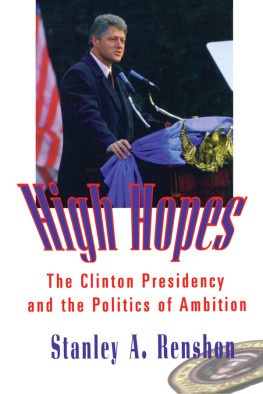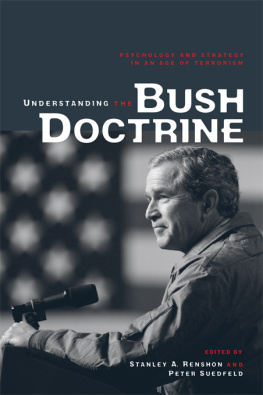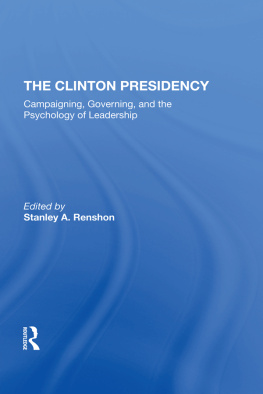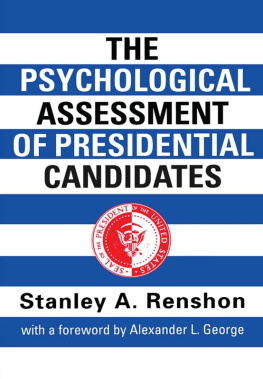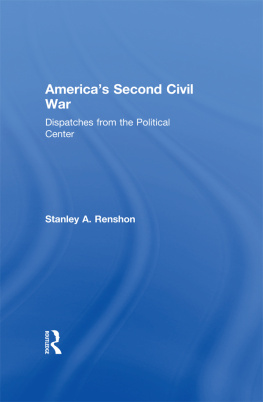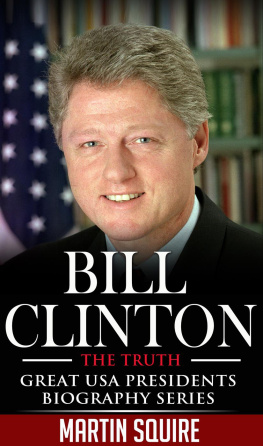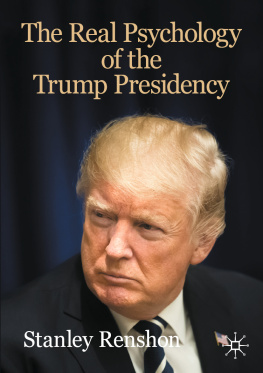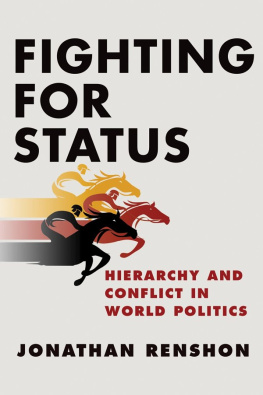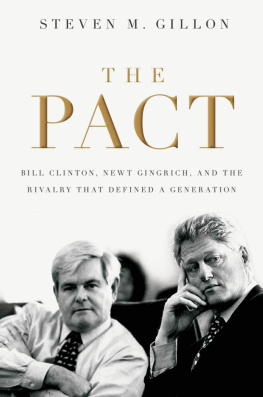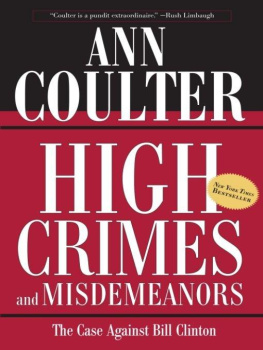Stanley A. Renshon
He is many a mothers dream and most fathers nightmarea smart, educated, disarmingly sincere and decidedly charming suitor, but with a moral compass frozen at self-interest. He is the most skillful politician to occupy the White House since Lyndon Johnson, and one of the toughest. And he remains a man of puzzling and inconsistent political principles announcing that the era of big government is over even as he unveils dozens of new initiatives.
In the two years since High Hopes was published, the unintended ironies resulting from these paradoxes have reached extraordinary levels. This most empathetic of presidents has been credibly accused on national television of the crude sexual groping of a woman in difficult emotional and financial circumstances seeking his help. While deciding whether to launch a military attack against Iraq, his administration has worried out loud that a dark, humorous, and unnerving movie satire in which a president starts a phony war to distract attention from a sex scandal might give the public the wrong idea. And the president who promised the most ethical administration in history has presided over one in which resignations for ethical cause, indictments, convictions, judicial reprimands, appointments of special investigative prosecutors, and continuing questions about ethical and possibly criminal behavior have played a defining role.
Paradoxically, the president has simultaneously enjoyed strong public approval for his performance in office. His approval ratings rarely broke 45% before the 1994 election, one which resulted in huge Democratic losses. Thereafter, faced with the enforced bipartisanship of a Republican majority in both houses of Congress, his poll numbers began to rise. By July of 1995, stimulated in part by a massive issue ad campaign conducted away from major northeastern metropolitan markets, the presidents approval ratings broke 50%, held and rose.
So, while a majority (53%) of the public believe that the president lied when he said he had no sexual relationship with 21-year-old White House intern Monica Lewinsky, most (60%) thought it not an important matter, and 65% wanted him to remain in office even if he did.
Character Above All? Or, Character Permeates All?
In a book of essays on modern presidents entitled Character Above All ,
So, is it true then that a presidents personal life, and the psychology it reflects, has no bearing on his presidency? In a word, no. Still, if character above all doesnt describe the relationship between a president and the office, or to the American public, what does? High Hopes attempts to provide an answer. It views character not as a presidents supreme virtue (or failing), but rather as a set of psychological patterns that he brings to every circumstance. Character, from this perspective, is the answer to the question of how we can best understand a presidents, or any persons psychology. It is the foundation of ones stance toward the world. It reflects the fundamental elements at the core of a persontheir basic ambitions, the ideals and values they live by, and their relationships with others.
Although character runs deep, knowledge of it doesnt necessarily require couch questions. We get to know a persons character in the presidency, as in ordinary life, by paying attention to the steady accumulation of choices we see them make, both in and away from the public spotlight. Character is reflected as much in a presidents observable behavior as it is in the deepest recesses of his psyche. All that is needed is some knowledge of where to look and how to understand what you see.
The public evidence regarding Bill Clintons character after an adulthood in public life is fairly clear. He is a man of enormous ambitions. There is nothing inherently wrong with having ambition, even lots of it. It is the lifeblood of achievement and no modern president has been without ample amounts of it. The problems with this presidents ambition do not lie in its quantity.
He is also amply endowed with the talents and skills that realize ambition. He is extremely charming and intelligent, enormously resilient, and a loquacious but eloquent advocate of his views. Yet, it cannot be emphasized too strongly that a presidents skills and talents, as substantial as they might be, are embedded in, and not independent of, his interior psychology. They do not exist independently of his character structure and overall psychologyhis ambitions, ideals, and connections with others.
Neither ambition nor the talents which support it can be understood without asking to what purposes they are put. To answer this central question we must look to the ideals and values that guide a president, and when they do so. We must not be misled by what presidents say of their lofty ideals. Rather, it is the ability to maintain fidelity to their ideals when to do so risks personal or political losses that defines character integrity. In short, for a president to have the courage of his convictions, he must have both.
Character integrity helps to answer a central question about presidential ambition. How can we distinguish between dangerous and necessary ambition? Ambition is dangerous when it is unguided by ideals and values and the capacity to be faithful to them. And, alternatively, the dangers of ambition are defused when firmly guided by ideals, a strong sense of values, and the willingness to stick with them through adversity. Indeed, the larger the ambition, the more consolidated a presidents ideals and values must be in order to anchor it.
The question, simply put, is this: Is the presidents ambition in the service of his ideals, or are his ideals subservient to his ambitions? This is the great linchpin of character that has eluded Bill Clinton in his public and private life. Even those who worked most intimately with him have failed to discern what, beyond his own self or political interest, he is willing to stand fast for and in doing so accept his limits and his losses. George Stephanopoulos told Elizabeth Drew that he was unable to discern the real Clinton, and later referred to him as a kaleidoscope, where what you see is where you stand. It was real, he continued, but it could change in an instant, as soon as Clinton turned. Of course, a deeply held set of ideals and values cant change in an instant. If they are a core part of a person, they will not be dependent on perspective and favorable or unfavorable political views will have difficulty distorting them. Even the presidents most rabid advocates have wondered about his real commitments. James Carville told Bob Woodward that he once took out a piece of paper, drew a square and began tapping his pencil and asking, Where is the hallowed ground where does he stand?

